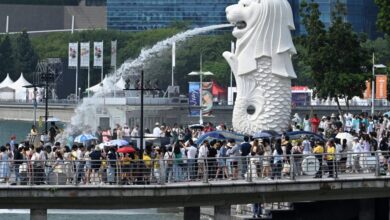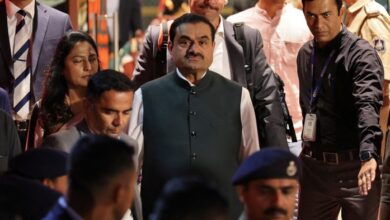Hostage death puts pressure on Netanyahu over deal with Hamas
For the past 10 months, the families of Israeli hostages held by Hamas have led protests, covered local and international media and begged Prime Minister Benjamin Netanyahu to agree to a deal to bring their loved ones home — even if it means ending the war against Hamas.
So far, they have failed. But on Sunday, when news spread that six more hostages had been found dead in a tunnel under Gaza, apparently executed by their Hamas captors less than a kilometer from Israeli troops, a new wave of public anger spread. Israel. Much of this content is aimed at Netanyahu.
By Sunday night, tens of thousands of Israelis had poured into the streets of Tel Aviv, demanding that Netanyahu compromise and accept a deal that would release the hostages in exchange for a lasting ceasefire and the release of thousands of Palestinian prisoners.
A general strike shut down much of the country on Monday morning after an influential union acceded to a call from the hostages’ families. Ben Gurion International Airport halted departures, while universities, shopping malls and ports were closed.

But the outpouring of public grief and anger also reflects a divided nation — Netanyahu’s far-right allies, including finance minister Bezalel Smotrich, have criticized protesters and union leaders for “carrying out [Hamas chief Yahya] “Sinwar’s Dream”. Several right-wing cities and settlements said they would not join the strike.
Tensions between the two sides have been rising as it becomes clear that time is running out for the remaining 101 hostages in Hamas custody, at least 35 of whom are believed to be dead by Israeli officials.
Meanwhile, relatives of the captives are growing increasingly desperate — and angry with Netanyahu. “If we don’t succeed in getting the Israeli government to say ‘yes’ without reservation, then the evidence will show that all of those hostages will die in Hamas captivity,” said Jonathan Dekel-Chen, the father of 35-year-old Sagui, who was taken from a kibbutz on October 7.
“There is no reasonable explanation [for Netanyahu’s rejection of the deal] beyond domestic political considerations and maintaining power,” he added.
Smotrich and other far-right ministers have repeatedly threatened to collapse Netanyahu’s coalition if he accepts a deal involving a comprehensive ceasefire, while demanding greater military pressure on Hamas to free the hostages.
But so far, Israeli forces have only rescued eight of the roughly 240 people taken hostage on October 7, mistakenly killing three. However, 105 were released in November in a negotiated exchange for Palestinian prisoners, during a brief ceasefire as humanitarian aid poured into the besieged enclave.
Hamas blamed Sunday’s hostage deaths, and many previous hostage deaths, on Israeli airstrikes and Netanyahu’s intransigence. It has not changed its core demand that any full hostage rescue — including the captured Israeli soldiers — be contingent on a full ceasefire, repeating that demand on Sunday afternoon.
But the second negotiated prisoner-for-hostage swap has proved elusive, despite a push by the United States, Egypt and Qatar in mid-August to persuade the warring parties to agree to a U.S.-backed proposal. The lack of progress has led to a public blame game that has divided Israeli politics and angered mediators.
The talks appeared to have stalled as Hamas demanded guarantees that a lasting ceasefire would follow the hostage exchange, and that Israeli troops would withdraw completely from Gaza. Netanyahu, for his part, has insisted on demands that Israeli troops remain in control of the Gaza-Egypt border.
“The delay in signing the agreement has led to [Sunday’s] the deaths of many other hostages,” said the Forum for Missing Families and Hostage, an advocacy group. “We call on Netanyahu: Stop hiding. Give the public a good reason for this ongoing abandonment.”

It remains to be seen whether this new furor will create enough political pressure to force Netanyahu to change his stance.
According to some polls, the Israeli public largely supports the negotiated deal with Hamas to free the hostages, but regular protests in Tel Aviv have yet to develop into a major nationwide movement.
On Sunday, the mood appeared to have changed as the streets filled with protesters and much of the media and political opposition demanded that Netanyahu compromise.
But Netanyahu — Israel’s longest-serving prime minister — has weathered larger, longer-lasting protests before. “We did a lot to mobilize the public, to make sure there was a majority [in the public opinion] to reach an agreement,” said Moshe Lavi, brother-in-law of hostage Omri Miran.
“But we can’t get into the sole decision maker who needs to make the call — and if he doesn’t want to make that call, he should be honest with the families,” he added.
“I have spoken to many political and security officials, and I have heard that the deal is not moving forward because of political considerations,” said Arnon Bar-David, president of the Histadrut labor union.
Dahlia Scheindlin, a veteran pollster who has closely followed the protest movement, said that while it is unclear whether public opinion could force Netanyahu to act, “if… there is a general strike and influential political and social leaders help bring the country to a standstill, that could force the government to change policy.”
Netanyahu denied that his demands on the Egypt-Gaza border had delayed a possible deal, saying Hamas had refused to engage in serious negotiations for months. He said Israel had agreed to an updated framework for the US-backed deal, which Hamas had formally rejected.
“In recent days, as Israel has been engaged in intensive negotiations with mediators in a desperate attempt to reach an agreement, Hamas has continued to steadfastly reject all proposals,” Netanyahu said. “Worse still, at the same time, they have killed six of our hostages.”
But leaks to Israel’s Channel 12 over the weekend painted a different picture, angering many families of the hostages, who have long warned that Netanyahu was stalling a deal to preserve his coalition.
Channel 12 reported that the prime minister had a disagreement on Thursday at a cabinet meeting with defense minister Yoav Gallant, who warned that Netanyahu’s insistence on keeping Israeli troops along the Egypt-Gaza border would threaten hostage talks and voted against it.
“The cabinet must meet immediately and reverse the decision taken on Thursday,” Gallant said after the bodies were found. “It is too late for the hostages who were brutally murdered.”
About 40,000 Palestinians have been killed since Hamas’ October 7 offensive, according to local health officials, most of them women and children, as Israeli forces destroyed much of the area. At least 1,200 people have been killed by Hamas in cross-border raids into Israel, according to the government, including many civilians.
The war has created a worsening humanitarian crisis marked by extreme hunger, widespread disease, and the displacement of most of Gaza’s 2.3 million civilians into UN shelters and vast tent cities.




